Energy Efficiency, GHG Emissions, Regulation - October 30, 2024
2024 Net Zero Forum Wrap-Up
As Smart Energy Decisions looks ahead to its 2025 events, let’s look back at our final event of 2024, Net Zero Forum Fall, held in September at the Westin Westminster in Colorado.
Net Zero Forum Fall included SED’s tried-and-true mix of educational sessions and a variety of networking opportunities to help energy customers connect with their peers and with suppliers to develop energy and sustainability strategies, troubleshoot problems and bring projects from ideas to implementation.
A key component of SED Forums is the one-to-one business planning meetings between energy customers and suppliers. The event facilitated more than 300 of these meetings as a way to begin or continue relationships.
Destination: Net Zero, SED’s bootcamp-style workshop offered energy customers an interactive deep dive into fundamental Net Zero concepts, strategies, and tactics. Separate Peer-to-Peer Conversations for energy customers and suppliers allowed each group to explore industry challenges and successes.
In addition to a series of keynotes, Net Zero Forum featured Spotlight Sessions on a variety of industry topics presented in smaller settings to allow for more interaction among subject matter practitioners, industry experts and energy customers. The event also featured “Office Hours,” an opportunity for attendees to seek advice and discuss pressing issues with experienced industry professionals.
The event featured the presentation of SED’s 2024 DEI Impact Awards to recognize efforts in diversity, equity and inclusion in clean energy.
Here are highlights from Net Zero Forum Fall’s keynote presentations:
“Keynote: Navigating Common Hurdles in Sustainability Planning”
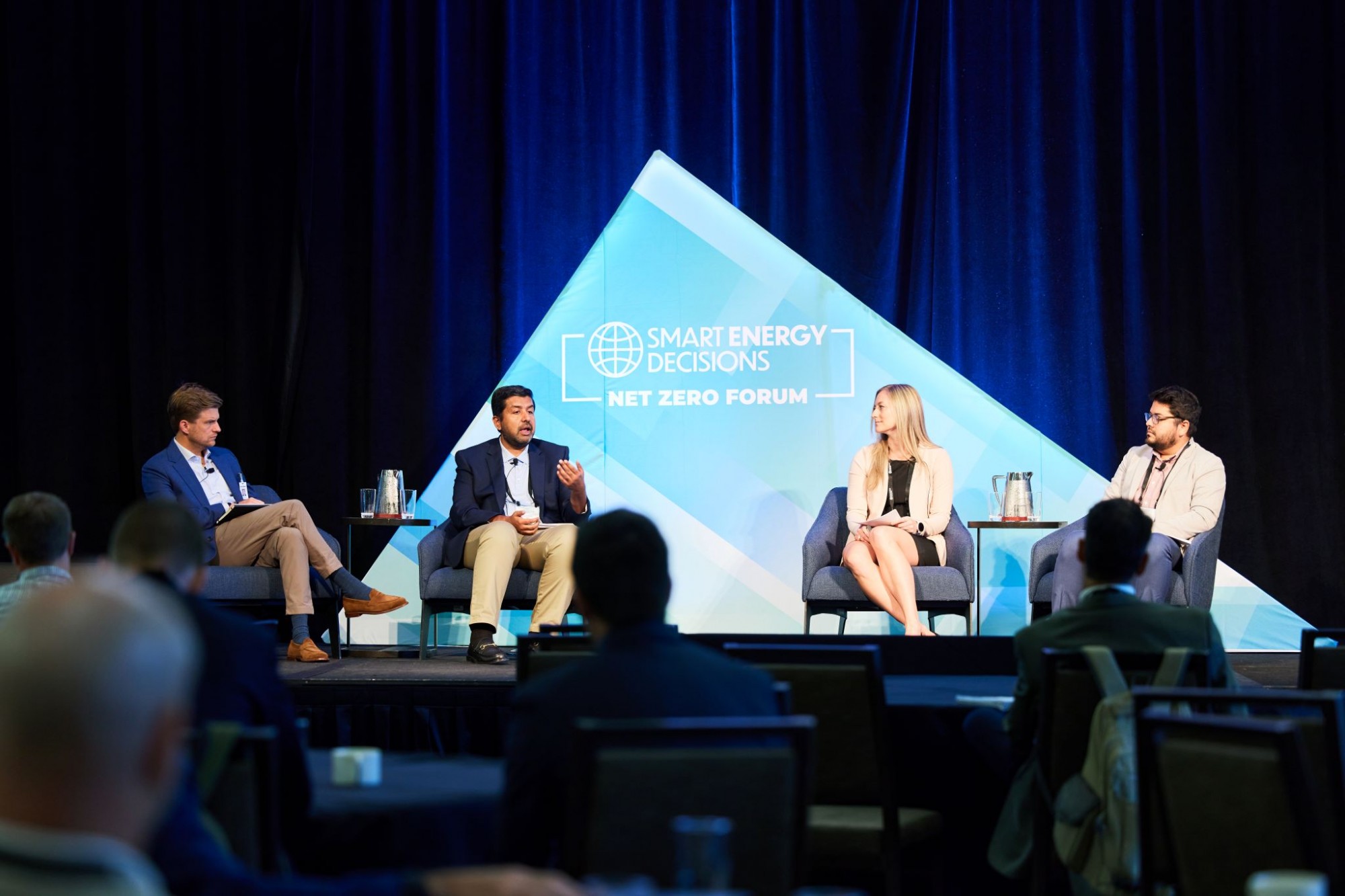 Constellation’s Abhinav Krishna (second from left), Vice President of Commercialization & Development, opened this session by shedding light on trends in sustainability, including an increase in sustainability-conscious supply chain participants, investment from clean tech and ESG funds, and an increased focus on Scope 3 emissions. “There’s suddenly a lot of excitement and initiatives around sustainability across organizations,” Krishna shared. “Organizations that are prioritizing sustainability are setting themselves up to be successful in an evolving global economy.”
Constellation’s Abhinav Krishna (second from left), Vice President of Commercialization & Development, opened this session by shedding light on trends in sustainability, including an increase in sustainability-conscious supply chain participants, investment from clean tech and ESG funds, and an increased focus on Scope 3 emissions. “There’s suddenly a lot of excitement and initiatives around sustainability across organizations,” Krishna shared. “Organizations that are prioritizing sustainability are setting themselves up to be successful in an evolving global economy.”
“The clients we talk to who are starting their journey are focused on direct and indirect emissions, while those who have already gone down the path a little farther are now discussing Scope 3 and supply chain emissions,” he added.
Sunny Sanwar (right), Managing Director of Digital Solutions at Constellation, expounded on the cross-industry shift to focusing on Scope 3 emissions and how it presents different challenges to different sectors. “For manufacturing, it's a very specific ask,” Sanwar explained. “For a service business, it's quite different, and those are some of the things that we hear all the time.”
Sanwar also shared about the most common challenges they're currently helping customers navigate, including how to automate emissions reporting with readiness for audits. He listed some of the questions that demonstrate these challenges: “Can I get a more granular view of my usage information? Can I look at my supplier-specific emission factor, and location-specific? What about levels of detail?”
Principal of Commercialization & Development Melissa Heim (second from right) added that another common challenge across customer types is prioritization of an ever-growing number of sustainability initiatives.
"Efficiency projects, RECs, carbon offsets, VPPAs," she said. “How do you know what's legitimate, and how do you know where to prioritize your time and your money? That’s what we hear commonly across the board from customers, regardless of whether they're just starting their sustainability journey or they're a little bit further along.”
“Striking the Balance: Navigating Decarbonization and Business Objectives for Success”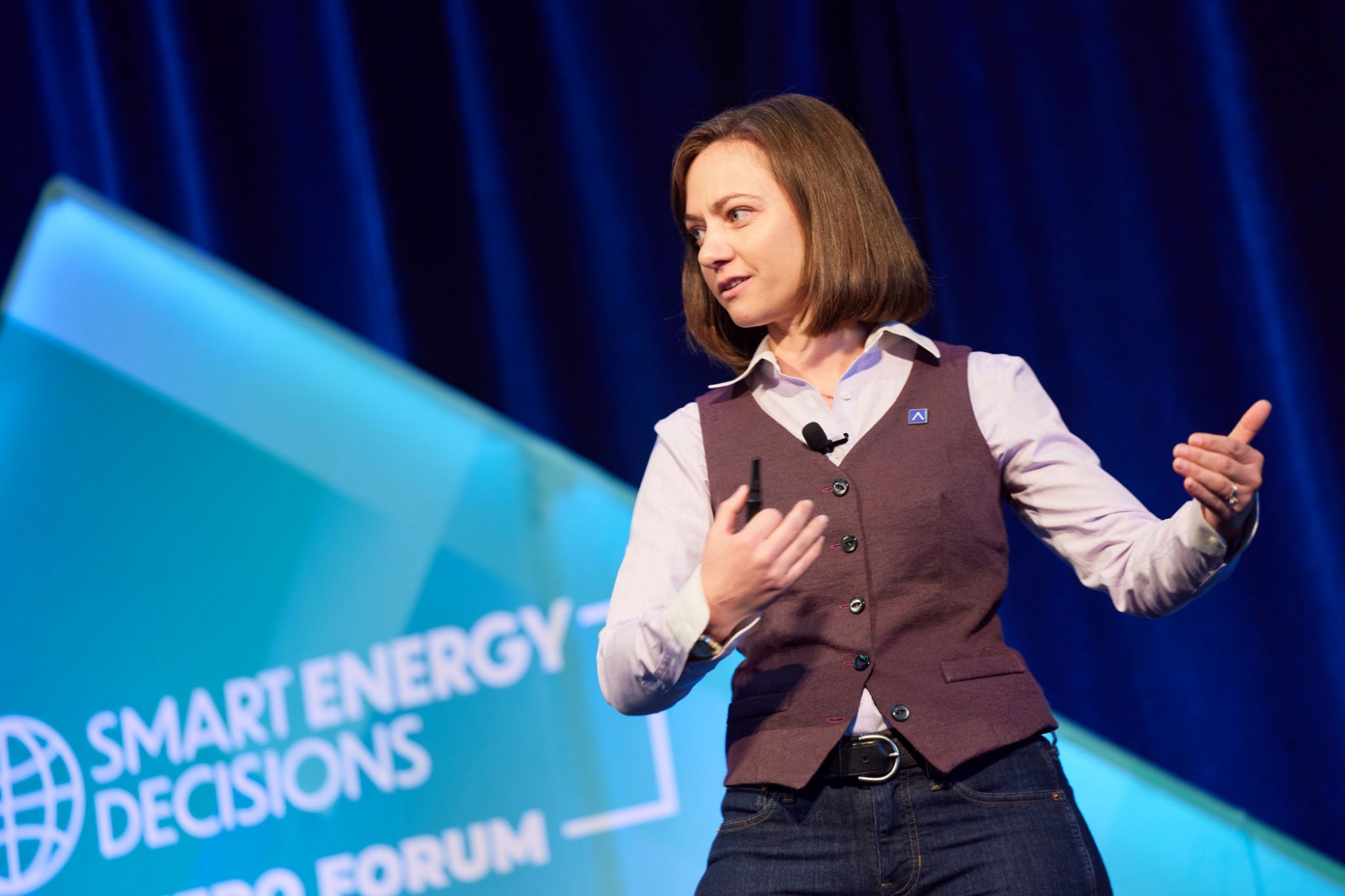 In discussing what is driving decarbonization today, Becky Wacker, Director of Sales, Energy Services, Trane Commercial US, explained, “There are lots of carrots and lots of sticks,” carrots being incentives such as the Inflation Reduction Act, utility rebates and grants. “You’ve heard about all this free money, but there are also a lot of regulations coming. Think of those as the sticks, because there will be a penalty if you don't look at sustainability and decarbonization.”
In discussing what is driving decarbonization today, Becky Wacker, Director of Sales, Energy Services, Trane Commercial US, explained, “There are lots of carrots and lots of sticks,” carrots being incentives such as the Inflation Reduction Act, utility rebates and grants. “You’ve heard about all this free money, but there are also a lot of regulations coming. Think of those as the sticks, because there will be a penalty if you don't look at sustainability and decarbonization.”
Wacker noted that 13 cities and states across the U.S. have enacted building performance standards, representing 25% of buildings, with more coming including an additional 30 that have been publicly stated. In order to meet these standards, said Wacker, “You need to understand with an audit what your building uses today. You need to have plans for what you're going to do about it, and you need to measure and verify those plans. It’s pretty simplistic, but now there is a fine tied to not meeting those building performance standards.”
“The Current State of Sustainability”
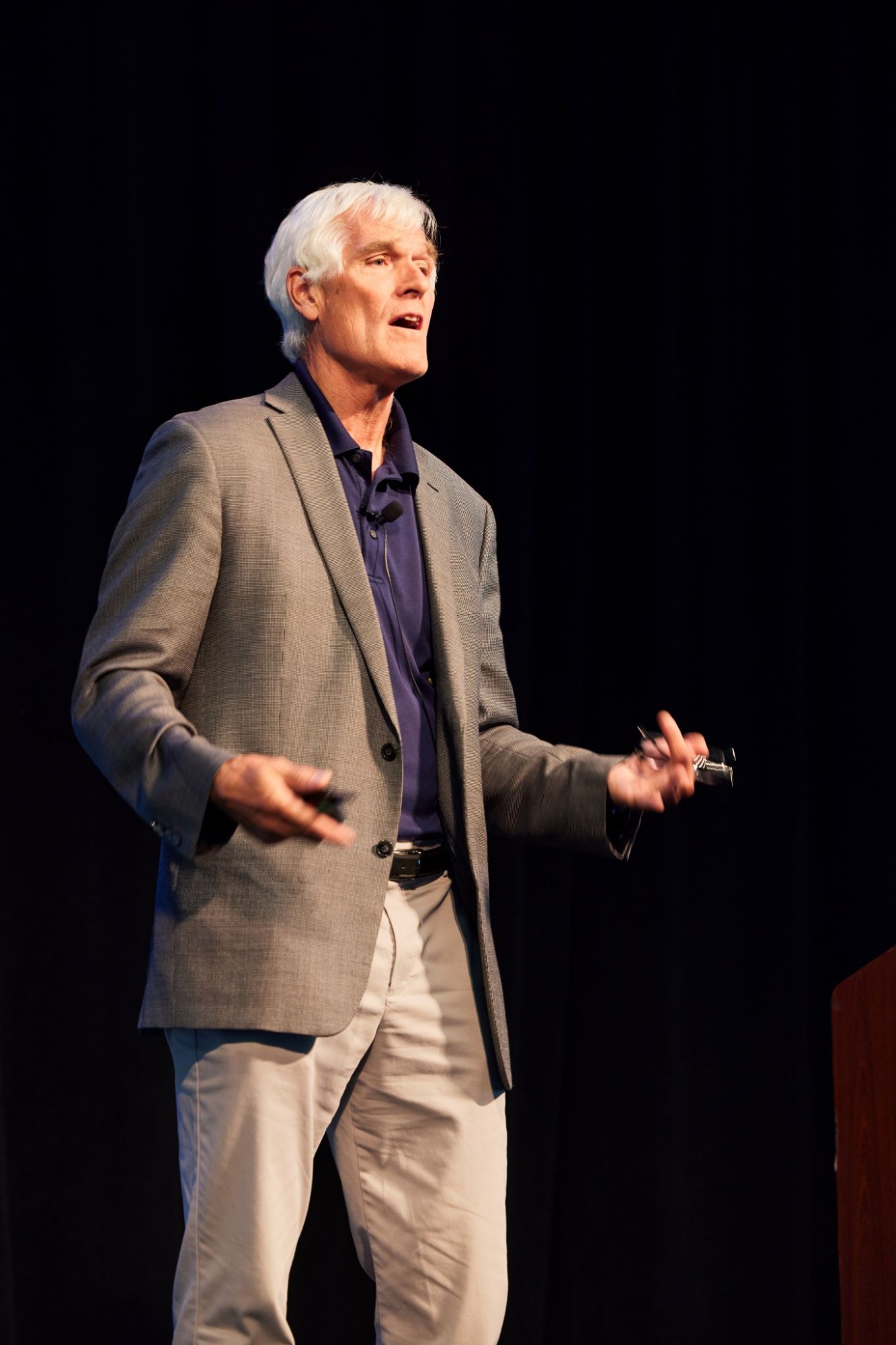 In his thorough and engaging update on the clean energy field, Peter Kelly-Detwiler covered the evolving generation mix; interconnection and pricing woes; emerging technologies such as SMRs, geothermal, long-duration storage and hydrogen; and a look at new demand pressures brought on by AI and data centers. He also noted the complexity of the clean energy landscape. “If we wanted to do something easy, this is not the industry we would have joined. We picked one of the most challenging, fascinating areas to solve: How do we as a society decarbonize our global economies? Humanity has never tried to solve anything like this before."
In his thorough and engaging update on the clean energy field, Peter Kelly-Detwiler covered the evolving generation mix; interconnection and pricing woes; emerging technologies such as SMRs, geothermal, long-duration storage and hydrogen; and a look at new demand pressures brought on by AI and data centers. He also noted the complexity of the clean energy landscape. “If we wanted to do something easy, this is not the industry we would have joined. We picked one of the most challenging, fascinating areas to solve: How do we as a society decarbonize our global economies? Humanity has never tried to solve anything like this before."
Kelly-Detwiler ended with this advice: “We have to do what we have to do, whether it's simple or not. We might as well enjoy the ride and bring our joy and passion and intelligence to this game we all play.”
“Driving Decarbonization: From Regions to Facilities”
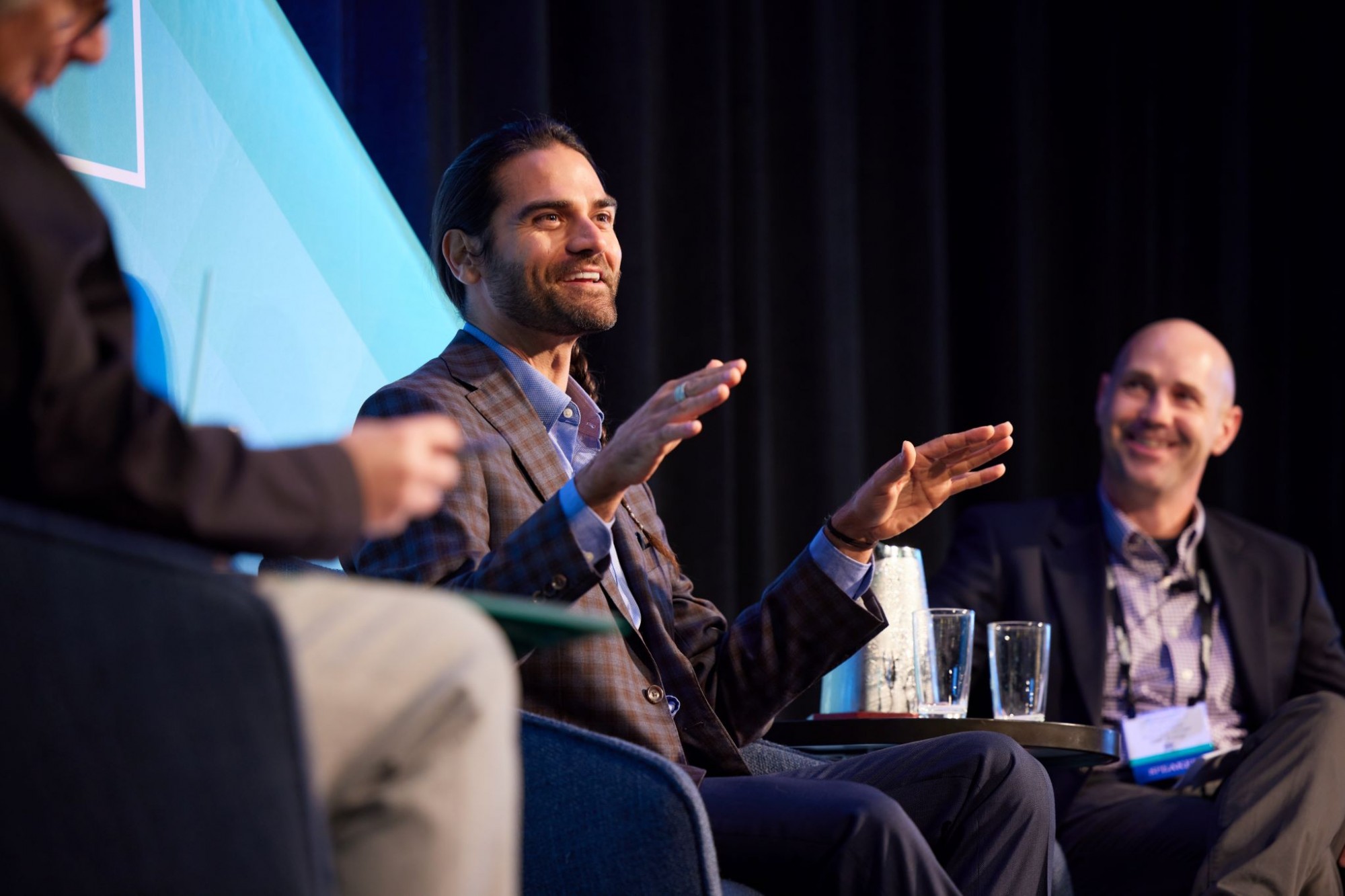 Exploring whether there is a consistent message across regions in terms of obstacles and strategies for decarbonization, Shell Energy’s Travis Sheehan (left), North American Lead – Cities & Hubs, compared working with Houston and Los Angeles on its “Decarbonizing America” campaign. “California is one of the most progressive states when it comes to low-carbon fuel,” he said. “ Houston is the opposite: There aren’t a lot of local incentives to decarbonize. But both have the same goal to reach carbon neutrality by 2050, so what an interesting experience to listen to these stakeholders!”
Exploring whether there is a consistent message across regions in terms of obstacles and strategies for decarbonization, Shell Energy’s Travis Sheehan (left), North American Lead – Cities & Hubs, compared working with Houston and Los Angeles on its “Decarbonizing America” campaign. “California is one of the most progressive states when it comes to low-carbon fuel,” he said. “ Houston is the opposite: There aren’t a lot of local incentives to decarbonize. But both have the same goal to reach carbon neutrality by 2050, so what an interesting experience to listen to these stakeholders!”
Sheehan continued, “In Houston, there is interest in the energy transition from the large-scale upstream oil and gas space as well as the power space. Their question is, how do we get grant funding? How do we find partners? In Los Angeles, it was more about how to incorporate social equity and environmental justice aspects into the practical aspects of putting solar panels on roofs or bringing poly-fuel hubs for electric hydrogen and renewable diesel for the heavy-duty trucking industry.”
In working with customers, Chris Kaiser (right), Senior Sales Manager at Shell Energy said, “I always bring it back to timelines, goals and budgets. Customers must have a very candid, open discussion within their organization about how to align these three factors to reach decarbonization goals.”
Kaiser also encouraged customers to look at the bigger picture, noting that sustainability projects are also capital projects and that “these will require an investment from your company, so your leadership will look at it differently.” He advised, “Get a firm understanding of how your organization measures and buys capital projects. Understanding the nuances of the financial metrics is important.” So is alignment across the organization, he added, including “everyone from sustainability to the operations level, because if all those folks aren't involved with the project, there's going to be a breakdown, and it's probably not going to happen.”
“From Basics to Impact: How Offsets Support Sustainability Programs”
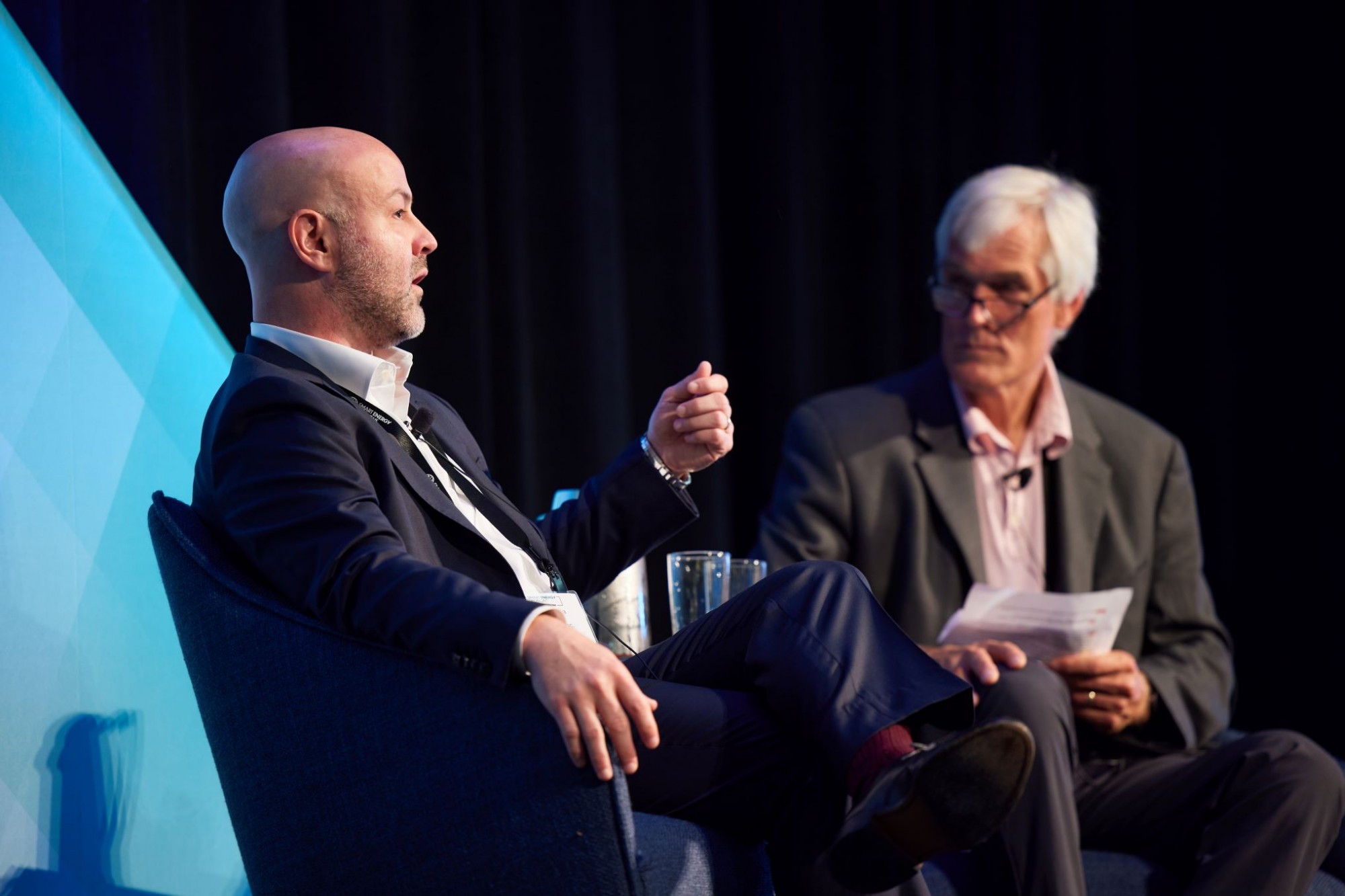 Bernie Kinsella (left), Director of Origination, Environmental products for NRG Energy, Inc., in a conversation with Kelly-Detwiler, offered a view of the recent maturation of the carbon offset market
Bernie Kinsella (left), Director of Origination, Environmental products for NRG Energy, Inc., in a conversation with Kelly-Detwiler, offered a view of the recent maturation of the carbon offset market
“Over the last two and a half years, we've gone from irrational exuberance to, rightly so, questioning of the industry in general to the industry responding to that criticism,” Kinsella said. “We do need to grow up as an industry. We need to start adopting standardized practices, standardized tools, increasing technology, and increasing financial structures that the broader economic system uses every day. And we need to use those in a way to show organizations that these tools are effective tools and that this is not snake oil, so to speak.”
Kinsella added that carbon offsets are going to continue to be a solution as the market evolves. “They're tools that organizations can do and will continue to use, and that it is incumbent upon the industry to utilize best practices, the best technology available and the best financial tools available to showcase efficacy to organizations,” he explained.
Get ready for Smart Energy Decisions 2025 events:
- Net Zero Forum: Spring, April 22-24 at the Hyatt Regency Lost Pines Resort and Spa in Lost Pines, Texas
- Renewable Energy Forum, June 16-18 at the Diplomat Beach Resort, Hollywood, Florida
- Net Zero Forum: Fall, September 15-17 at the Marriott Tucson Starr Pass Resort & Spa, Tucson, Arizona
Read These Related Articles:
- Details Announced for SED's Net Zero Forum
- Ratio Institute Partners with Net Zero Forum
- Let’s Measure Sustainability with an Aim to Improve Operational Performance and Profits
- SED Welcomes ENERGY STAR, iMasons, IMT, Ratio Institute, and Second Nature to the Net Zero Forum
- Net Zero Forum to be SED’s Largest Event Ever
Stay Up-To-Date












